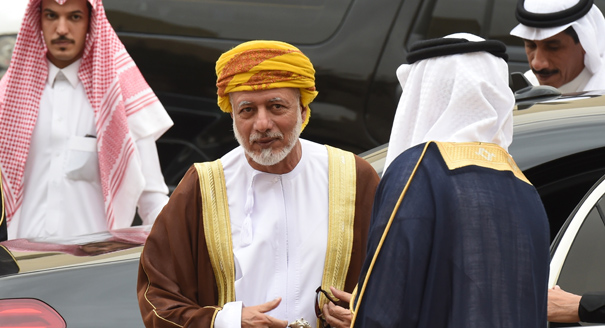Oman’s efforts to avoid taking sides in a polarized region has brought it headaches, but also benefits.
By chance I recently met the American academic Stacey Philbrick Yadav in a hotel lobby in Muscat, Oman. As we chatted it was clear we were both there to look more closely at a country that has not involved itself in the conflicts dividing the Gulf and the region.
The Omani capital has become a prime destination for those trying to understand the role the sultanate plays in an unstable environment—that of a state that has remained neutral and retains contacts with all sides. Since a Saudi-led coalition began military operations in Yemen in March 2015, Oman has been the only Gulf Arab country not to take part, avoiding implication in a war that has turned out to be much costlier, and bloodier, than initially expected. At the same time, Oman has sought to help resolve the Yemen conflict and the more recent crisis with Qatar, a political attitude that reflects a tendency to play the role of mediator, similar to the time when the Omanis provided a “back channel” in talks over a nuclear deal involving Iran starting in 2009.
The broad lines of Oman’s foreign policy took shape during the Arab boycott of Egypt, after its signing of the Camp David Accords with Israel in 1978. They crystallized during the Gulf war of 1980–1988, when Muscat declined to take part in the Arab alignment against Iran. Even in the period preceding the Yemen war of summer 1994, the Omanis hosted the final meeting between rival leaders Ali Abdullah Saleh and Ali Salem al-Beidh in a last-ditch attempt to mediate between the two.
Oman has just 4 million inhabitants, but it is the second largest Gulf Arab state by area. It is ruled by Sultan Qaboos bin Said Al Said, who last appeared in public in November 2016, after a long absence, to meet then-U.S. secretary of state John Kerry. After decades of rule, the sultan is said to be ill. He came to power in a coup against his father in 1970, launching an exceptional revival from which the sultanate has benefited for decades.
Oman has built stable, permanent, and solid relations with its diverse neighbors, a reality facilitated by the traditional tolerance of the dominant Ibadi sect. This, like the sultanate’s lack of political parties, has left a deep mark on the political character of Oman. The country is generally quiet, inclined to listen, and sedate. Its institutions often take their inspiration from the British traditions of discretion and patience, while the hand of Britain can also be perceived in Oman’s institutions. Oman may be the only state that has not had an obvious and organized opposition against the government since the late 1970s, when the then-South Yemeni regime put an end to its support for the Dhofar Liberation Front, after it was crushed by Oman with help from Britain and Iran.
NONALIGNMENT IN THE YEMEN CONFLICT
Since the start of the latest war in Yemen, Oman has played a key facilitation role. It has hosted Houthi leaders and representatives of former president Ali Abdullah Saleh. This, as well as its good relations with Iran, enabled it to stake out a middle ground, allowing it to engage in a political process to help resolve the conflict. As the Gulf coalition tightened the noose on the Houthis and Saleh, flights to and from Oman became a vital lifeline for the authorities in San‘a, allowing their negotiators to travel outside Yemen.
Oman’s dealings with the Houthis angered Saudi Arabia and its allies. For one thing, Muscat’s neutrality represented implicit condemnation of the war in Yemen, against the consensus in the Gulf. This earned the sultanate bitter criticism from eminent writers, academics, and political figures across the region. It also irritated the Saudis at a moment when they hoped to demonstrate unity behind the efforts of Prince Mohammad bin Salman, the Saudi crown prince and defense minister and a prime mover of the Yemeni intervention. The tension reached a climax when the Saudi-led coalition bombed Oman’s embassy in San‘a in September 2015.
As the Gulf coalition’s campaign in Yemen bogged down, however, the Saudi attitude changed. Looking to maintain a communications channel to the Houthis and Saleh, the Saudis saw an opening through their ties with Oman. This allowed Muscat to host secret negotiations between the Houthis and Riyadh in early 2016, and between U.S. officials and the Houthis in May 2015 and November 2016. By helping the Houthis, Oman gained their respect and was able to convince them to attend and remain engaged in the United Nations-sponsored talks in Kuwait in 2016. The Houthis may have broken almost every deal they signed, but Oman’s influence may allow it to moderate their behavior and hold them to agreements they sign.
As the war in Yemen has raged on, Oman has taken other steps that, though small, remain important. It has provided Yemenis with transit visas, received hundreds of wounded, and helped Yemenis reach third countries via Omani territory. It is still possible to meet victims of the 2016 bombing of a San‘a funeral hall in Muscat. While the United Arab Emirates (UAE) and some allies have tightened restrictions on entry visas for Yemenis, Oman has become less restrictive on transit visas.
THE QATAR CRISIS AND GULF RELATIONS
When the recent crisis with Qatar began, Oman came to the fore once again as an intermediary and a humanitarian facilitator. It immediately offered the use of its aircraft to transport Qatari citizens stranded in the states that had imposed a blockade against Doha. Meanwhile, Oman’s foreign minister and its leadership liaised with Kuwait, which is currently leading efforts to mend the rift in the Gulf.
Such an approach allowed Oman to make two major gains from the crisis. First, it gained an influential ally in the Gulf Cooperation Council, namely Kuwait, which to a certain extent has adopted a similar approach as Oman in maintaining an equal distance from all sides in the region. And second, the crisis has done away with the accusation that Oman is dividing the Gulf. Official and public anger, once directed at Oman, is now focused on Qatar, releasing Oman from the role of black sheep of the GCC.
While Oman has clear disagreements with Saudi Arabia, particularly over Iran, the differences between them have not, so far at least, reached the point of outright confrontation. Omani officials argue that their past policy of mediating with Iran was largely focused on enhancing Gulf security. They say that were it not for the nuclear deal with Tehran, the early outlines of which Oman helped formulate, Saudi Arabia’s regional archenemy would by now have had a full-fledged nuclear weapons program.
Oman’s disagreements with the UAE are more overt than those with Saudi Arabia. The two countries are competing indirectly to increase their clout in eastern Yemen. The UAE has for the first time expressed an interest in the Yemeni island of Socotra (one of the major natural habitats in the world), where foreign influence was long limited to Oman, as it was in the Mahra region of eastern Yemen. Emirati ambitions in the enclave of Musandam, a sliver of Omani territory surrounded by the UAE and jutting into the Strait of Hormuz, is another reason for the rivalry between the two, adding impetus to the Emirati challenge to Oman’s role in Yemen.
While Oman is serving an important function in Yemen, thanks to an unwritten mandate from the other Gulf states, it is not clear whether that mandate also applies to the crisis with Qatar. That is especially true given Muscat’s cool relations with the UAE, the most hardline nation in the standoff with Doha. For the moment, the sultanate is taking a back seat to Kuwait and may be content to continuing to do so.
THE CHALLENGE OF SUCCESSION
Walking through the streets of Muscat, one sees a city that has preserved its historical character. The authorities have imposed tight restrictions on new buildings. My guide proudly showed me the two houses of Oman’s parliament, saying that Sultan Qaboos had personally overseen their design. Despite the appeal of such hands-on leadership, the overwhelming sense that the sultan is behind everything is a problem for Oman, where decision-making is still extremely centralized. That is why the prospects for the succession in Oman are so important.
The country has one of the oldest written systems for the transfer of power in the world. The process is implemented by a council appointed by the sultan. If the council cannot reach an agreement, instructions are kept at Cambridge University that name the heir to the throne. These instructions must be consulted in order to resolve any possible dispute after Sultan Qaboos passes away. The system has never been tested, and it is unclear whether it will be sufficient to ensure a smooth transition.
More certain, however, is that Oman has so far avoided the mistake made by every other state that gained influence in Yemen, only to later lose it. It has not sought to finance a particular party inside the country. Partly, that’s because no country would be able to outspend Saudi Arabia. Yet the vast sums the kingdom has paid to Yemen’s influential tribal leaders have not persuaded them to stand with Riyadh. On the contrary, they have only exacerbated tensions. That is why Oman should pursue its more modest approach, both in Yemen and elsewhere. The sultanate has shown that non-alignment in a region that is riven politically creates new opportunities, and with it a level of power and influence. Oman has learned to thrive in the many spaces the region has left open for it, affirming the benefits of a subtle diplomacy that has also brought a measure of security.








